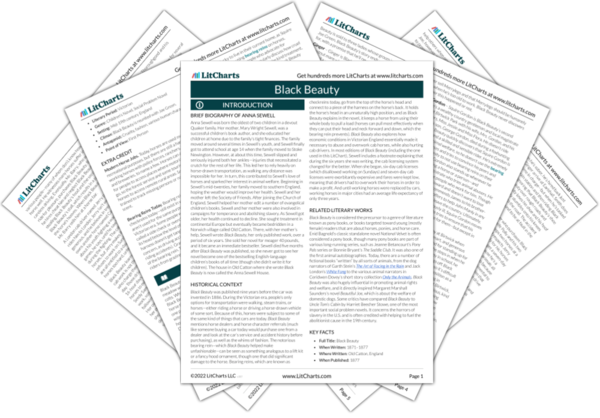Bearing reins represent people’s cruelty and willingness to selfishly force animals to suffer, all to make themselves look more fashionable. A bearing rein is a piece of a carriage horse’s harness that runs from the top of a horse’s head to the saddle portion of the harness. It holds the horse’s head in an unnaturally high position. As Black Beauty, Squire Gordon, and several other horse and human characters explain, bearing reins are extremely bad for a horse’s health. A horse name Max explains that while he doesn’t know if wealthy horse owners like the Lord W know how bad the bearing rein is, horse dealers and horse doctors do. They know full well, Max insists, that bearing reins cause horses to wear out faster, but they don’t care because this means people must regularly buy new horses to replace those that are too damaged to work anymore. To people like Lord W, Mrs. W, and the carter Jakes, it’s far more important to follow the fashion and crank a horse’s head up, as they see their horses as disposable and would rather look fashionable than attend to their horses’ comfort and well-being.
Further, the novel shows how bearing reins force a horse to move in a way different than they were designed to. A bearing rein creates strain in a horse’s neck, back, and legs; damages a horse’s breathing; and deprives a horse of a lot of its pulling power (horses can pull most effectively when they put their heads forward and down). So the bearing rein is, within the logic of the novel, something that violates a horse’s bodily autonomy and even goes against what God created horses to look like and do. Bearing reins, in this sense, highlight not just people’s cruelty and selfishness, but people’s conceited belief that they, and not God, should decide what animals look like.
Bearing Reins Quotes in Black Beauty
“They healed in time, and they forgot the pain, but the nice soft flap that of course was intended to protect the delicate part of their ears from dust and injury was gone for ever. Why don’t they cut their own children’s ears into points to make them look sharp? Why don’t they cut the end off of their noses to make them look plucky? One would be just as sensible as the other. What right have they to torment and disfigure God’s creatures?”
“[…] but what stuck in my mind was this, he said that cruelty was the devil’s own trade mark, and if we saw any one who took pleasure in cruelty, we might know who he belonged to, for the devil was a murderer from the beginning, and a tormentor to the end. On the other hand, where we saw people who loved their neighbours, and were kind to man and beast, we might know that was God’s mark, for ‘God is Love.’”
York came round to our heads and shortened the rein himself, one hole, I think; every little makes a difference, be it for better or worse, and that day we had a steep hill to go up. Then I began to understand what I had heard of. Of course I wanted to put my head forward and take the carriage up with a will, as we had been used to; but no, I had to pull with my head up now, and that took all the spirit out of me, and the strain came on my back and legs.
“I was at a dealer’s once, who was training me and another horse to go as a pair; he was getting our heads up, as he said, a little higher and a little higher every day. A gentleman who was there asked him why he did so; ‘Because,’ said he, ‘people won’t buy them unless we do. The London people always want their horses to carry their heads high, and to step high; of course it is very bad for the horses, but then it is good for trade. The horses soon wear up, or get diseased, and they come for another pair.’”
“Is it not better,” she said, “to lead a good fashion, than to follow a bad one? A great many gentlemen do not use bearing reins now; our carriage horses have not worn them for fifteen years, and work with much less fatigue than those who have them; besides,” she added, in a very serious voice, “we have no right to distress any of God’s creatures without a very good reason; we call them dumb animals, and so they are, for they cannot tell us how they feel, but they do not suffer less because they have no words.”












